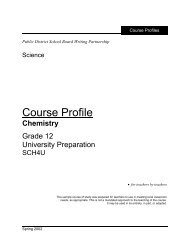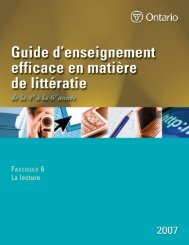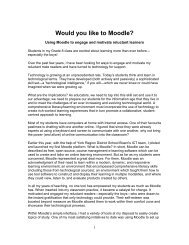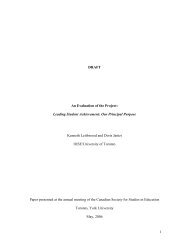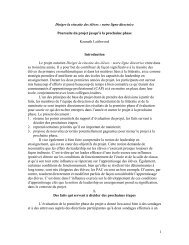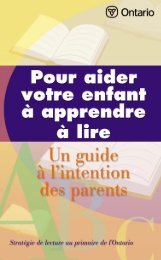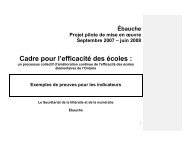a history of curriculum services canada
a history of curriculum services canada
a history of curriculum services canada
You also want an ePaper? Increase the reach of your titles
YUMPU automatically turns print PDFs into web optimized ePapers that Google loves.
1995-1996<br />
Help Wanted<br />
Since the publication <strong>of</strong> the Transition Years Catalogue, hundreds <strong>of</strong> calls had come to OCC’s 1-<br />
800 number to order materials, request copyright guidance, seek help co-ordinating <strong>curriculum</strong><br />
development projects, and so forth. Over the summer, many teachers also visited the <strong>of</strong>fice to<br />
examine inhouse copies <strong>of</strong> the materials listed in the catalogue. Temporary help was hired to<br />
manage the increased load, but it was becoming clear that more permanent help was needed,<br />
along with more <strong>of</strong>fice space. Thus, negotiations began with OPSBA for more space and<br />
clarification <strong>of</strong> the respective responsibilities <strong>of</strong> the two organizations within the lease<br />
arrangement. Staffing was put on the Work Group agenda for the fall.<br />
The greatest concern during the summer months, however, was the change in government and its<br />
potential ramifications. News <strong>of</strong> impending funding cuts left OCC vulnerable. On the positive<br />
side, OCC had been identified by MET as the agency for sharing resources produced by<br />
numerous <strong>curriculum</strong> co-operatives and by projects related to the Common Curriculum<br />
Innovation Fund. The Royal Commission on Learning had cited the Clearinghouse as a success<br />
story and over 400 teachers actively participated in their ENO and e-mail conferences.<br />
Moreover, at the Annual Meeting <strong>of</strong> the FWTAO in August, the new Minister, John Snobelen,<br />
placed great stress on the importance <strong>of</strong> teachers and <strong>of</strong> technology as an aid to effective<br />
teaching. OCC could point proudly to its consistent focus on teachers and to its growing use <strong>of</strong><br />
technology to provide pan-provincial, equitable service to the teaching community. On a more<br />
cautious note, the Ministry “strongly advised” that OCC develop self-sustainability and an online<br />
presence separate from that <strong>of</strong> ENO. No workable plan for self-sufficiency had emerged and<br />
ENO alone had been contracted for online <strong>services</strong>.<br />
Thus, when the Work Group met in the fall, there were many issues pending. One <strong>of</strong> the first<br />
motions taken was to identify a management communications consultant to assist in the<br />
development <strong>of</strong> a self-sufficiency plan. Instructions were also given to hire a secretary and to<br />
look into developing a distinctive home page for the OCC website. Partnership initiatives—in<br />
aid <strong>of</strong> both self-sufficiency and the development <strong>of</strong> a “one-stop shopping” service for teachers—<br />
were given new urgency. In early October, a memorandum <strong>of</strong> understanding was signed with<br />
the Asia-Pacific Foundation in which they agreed to list their materials with OCC and to track all<br />
orders channelled through OCC for the first year. They also indicated their willingness to pay a<br />
commission on future orders. This was encouraging. Perhaps a revenue stream could be<br />
developed through partnerships.<br />
Meanwhile, MET affirmed that it had no objection to OCC becoming incorporated, so the<br />
pursuit <strong>of</strong> name registration was abandoned in favour <strong>of</strong> a name search for incorporation. The<br />
latter outweighed the former legally and would ensure that the name “Ontario Curriculum<br />
Clearinghouse” was protected. The Work Group resolved to incorporate as quickly as possible<br />
and to achieve complete self-sufficiency by the year 2000. They hoped that MET would provide<br />
at least base funding until that time, since the process for developing self-sufficiency within the<br />
education community was unproven.<br />
©2008 Curriculum Services Canada 26



